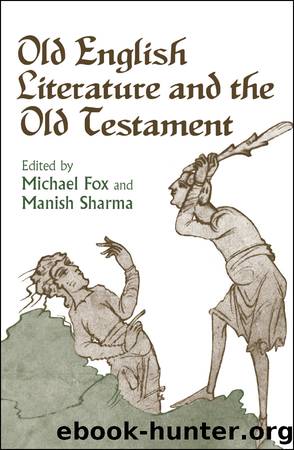Old English Literature and the Old Testament by Sharma Manish;Fox Michael;

Author:Sharma, Manish;Fox, Michael; [Fox, Michael and Sharma, Manish]
Language: eng
Format: epub
Tags: LIT011000, REL006410, REL102000
Publisher: University of Toronto Press
Published: 2012-11-14T16:00:00+00:00
The terminology here has a distinctly English flavour. The stanza contains the earliest attestation of the word hirð (war band), which derives from Old English hÄ«red (household, band of retainers). Ãláfr most probably brought both the term and the institution it denotes to Norway at the end of his English campaigns.50 Similar may be the case of þjóðkonungs (of the nationâs king); although this word occurs in purportedly earlier skaldic poetry, associated in our sources with the era of Haraldr hárfagri, Sigvatrâs use of it may have been reinforced by Old English þÄodcyning.51
The source of Ãláfrâs copious wealth, like that of other Viking adventurers, was in itself morally dubious â being the ill-gotten gains of raiding and Danegeld.52 He used it to win the personal loyalty of a large entourage, prominent among which were the skalds, with their skills in the creation of propaganda. Sigvatr speaks of himself (perhaps with an ironic side glance at St Martin) as donning a helmet from Poitou, a prestigious and valuable item. He alludes in NesjavÃsur, verse 9, to the auðván (hope of riches) entertained by himself and other followers of Ãláfr, and in verse 13 he uses a kenning for âwarriors,â hreifa elds viðir (trees of the fire of the hand; that is, trees of gold), that testifies to the wealth and munificence of their lord. The poet makes little apparent attempt to link these conspicuous treasures with Christian purposes. Such ingrained skaldic themes and ideologies were extremely resistant to modification, but then, as we shall see, some treatments of scripture embodied in the teachings of Ãlfric and other English writers could have been construed as giving them continued legitimacy, even in the face of new orthodoxies.
As Ãláfrâs reign continued into the third decade of the century, wealth, if an effective and even justifiable weapon, would increasingly prove itself dubious for another reason. In a series of stanzas from his VestrfararvÃsur Sigvatr speaks with surprising frankness about a golden offer that he himself received from Knútr, Ãláfrâs inveterate rival. The reference may not be simply personal but may be more broad, to Knútrâs initiative in offering to chieftains and other influential Norwegians gold in return for their support against Ãláfr.53 Advocates for Ãláfr could condemn Knútrâs initiative as an assault by Mammon upon righteousness, represented by Ãláfr,54 but, given Knútrâs early baptism55 and energetic patronage of ecclesiastical institutions in England,56 it would scarcely have been politically viable to anathematize him too strenuously.
Knútr hefr okkr enn Ãtri
alldáðgfugr báðum
hendr, es hilmi fundum,
Húnn, skrautliga búnar;
þér gaf hann mrk eða meira
margvitr ok hjr bitran
golls (ræðr grvallu
goð sjalfr), en mér halfa. (VestrfararvÃsur 5)57
Download
This site does not store any files on its server. We only index and link to content provided by other sites. Please contact the content providers to delete copyright contents if any and email us, we'll remove relevant links or contents immediately.
Machine Learning at Scale with H2O by Gregory Keys | David Whiting(4314)
Never by Ken Follett(3960)
Fairy Tale by Stephen King(3401)
Reminders of Him: A Novel by Colleen Hoover(3122)
The Man Who Died Twice by Richard Osman(3082)
Will by Will Smith(2924)
It Starts With Us (It Ends with Us #2) by Colleen Hoover(2370)
Rationality by Steven Pinker(2368)
Can't Hurt Me: Master Your Mind and Defy the Odds - Clean Edition by David Goggins(2344)
Friends, Lovers, and the Big Terrible Thing by Matthew Perry(2234)
The Becoming by Nora Roberts(2207)
The Stranger in the Lifeboat by Mitch Albom(2127)
Love on the Brain by Ali Hazelwood(2080)
New Morning Mercies: A Daily Gospel Devotional by Paul David Tripp(1920)
A Short History of War by Jeremy Black(1851)
The Strength In Our Scars by Bianca Sparacino(1847)
HBR's 10 Must Reads 2022 by Harvard Business Review(1847)
A Game of Thrones (The Illustrated Edition) by George R. R. Martin(1751)
Never Finished: Unshackle Your Mind and Win the War Within by David Goggins(1715)
